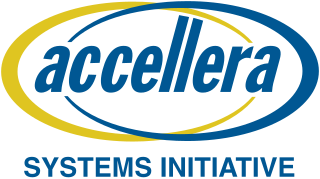Related Research Articles
In computer engineering, a hardware description language (HDL) is a specialized computer language used to describe the structure and behavior of electronic circuits, most commonly to design ASICs and program FPGAs.
Electronic design automation (EDA), also referred to as electronic computer-aided design (ECAD), is a category of software tools for designing electronic systems such as integrated circuits and printed circuit boards. The tools work together in a design flow that chip designers use to design and analyze entire semiconductor chips. Since a modern semiconductor chip can have billions of components, EDA tools are essential for their design; this article in particular describes EDA specifically with respect to integrated circuits (ICs).

Accellera Systems Initiative (Accellera) is a standards organization that supports a mix of user and vendor standards and open interfaces development in the area of electronic design automation (EDA) and integrated circuit (IC) design and manufacturing. It is less constrained than the Institute of Electrical and Electronics Engineers (IEEE) and is therefore the starting place for many standards. Once mature and adopted by the broader community, the standards are usually transferred to the IEEE.
The Phil Kaufman Award for Distinguished Contributions to EDA honors individuals for their impact on electronic design by their contributions to electronic design automation (EDA). It was established in 1994 by the EDA Consortium. The IEEE Council on Electronic Design Automation (CEDA) became a co-sponsor of the award. The first Phil Kaufman Award was presented in 1994.

The Design Automation Conference, or DAC, is an annual event, a combination of a technical conference and a trade show, both specializing in electronic design automation (EDA).
Unified Power Format (UPF) is the popular name of the Institute of Electrical and Electronics Engineers (IEEE) standard for specifying power intent in power optimization of electronic design automation. The IEEE 1801-2009 release of the standard was based on a donation from the Accellera organization. The current release is IEEE 1801-2018.
IP-XACT, also known as IEEE 1685, is an XML format that defines and describes individual, re-usable electronic circuit designs to facilitate their use in creating integrated circuits. IP-XACT was created by the SPIRIT Consortium as a standard to enable automated configuration and integration through tools and evolving into an IEEE standard.
The Design Automation Standards Committee (DASC) is a subgroup of interested individuals members of the Institute of Electrical and Electronics Engineers (IEEE) Computer Society and Standards Association. It oversees IEEE Standards that are related to computer-aided design. It is part of the IEEE Computer Society.
Within computing, the Rosetta system-level specification language is a design language for complex, heterogeneous systems. Specific language design objectives include:
Daniel Gajski is a Professor of the School of Information and Computer Science and the School of Engineering at University of California, Irvine, United States. He was previously the Director for the Center for Embedded Computer Systems (CECS), now known as the Center for Embedded and Cyber-physical Systems.
Mary Jane Irwin is an Emerita Evan Pugh Professor in the Department of Computer Science and Engineering at Pennsylvania State University. She has been on the faculty at Penn State since 1977. She is an international expert in computer architecture. Her research and teaching interests include computer architecture, embedded and mobile computing systems design, power and reliability aware design, and emerging technologies in computing systems.
The Marie R. Pistilli Women in Engineering Achievement Award is issued annually since 2000 by the Design Automation Conference (DAC) to honor the outstanding achievements of women in Electronic Design Automation. It is named after the co-founder of DAC, Marie Pistilli. Originally named as the "Marie R. Pistilli Women in EDA Achievement Award", it is named the "Marie R. Pistilli Women in Engineering Achievement Award" since 2016.
Subhasish Mitra is an American Computer Science and Electrical Engineering professor at Stanford University. He directs the Stanford Robust Systems Group, leads the Computation Focus Area of the Stanford SystemX Alliance, and is a member of the Wu Tsai Neurosciences Institute. His research ranges across Robust Computing, NanoSystems, Electronic Design Automation (EDA), and Neurosciences. He generally "teaches" EE 108 - digital systems design at stanford.
Soha Hassoun is American computer scientist. She is Professor and Past Chair (2013–2016) of the Department of Computer Science at Tufts University. Hassoun's interests lie at the intersection of machine learning and systems biology.
Anne Cirkel is an electronic design automation industry executive, who is currently Senior Director for Technology Marketing at Mentor, a Siemens Business.
Belle W. Y. Wei is an American electrical engineer and educator. As of 2020 she is Carolyn Guidry Chair in Engineering Education and Innovative Learning at San José State University.
Louise Trevillyan is an American electronics engineer, research staff member at the Design Automation Department, IBM Thomas J. Watson Research Center.
Ellen J. Yoffa is an American physicist and technical executive associated with the IBM Thomas J. Watson Research Center.
Kathryn Kranen is an American electronic design automation engineer and business executive.
Ann Rincon is an American electronic design automation engineer.
References
- 1 2 "Dr. Limor Fix to Receive Marie R. Pistilli Award for Contributions to the Advancement of Women in EDA at 48th DAC"
- 1 2 3 4 "Limor Fix", a profile at a Computing Community Consortium website
- ↑ "2011 MRP Award: Dr. Limor Fix, Electronic Design News, April 22, 2011